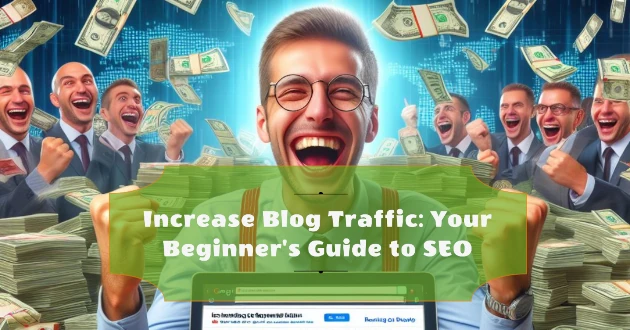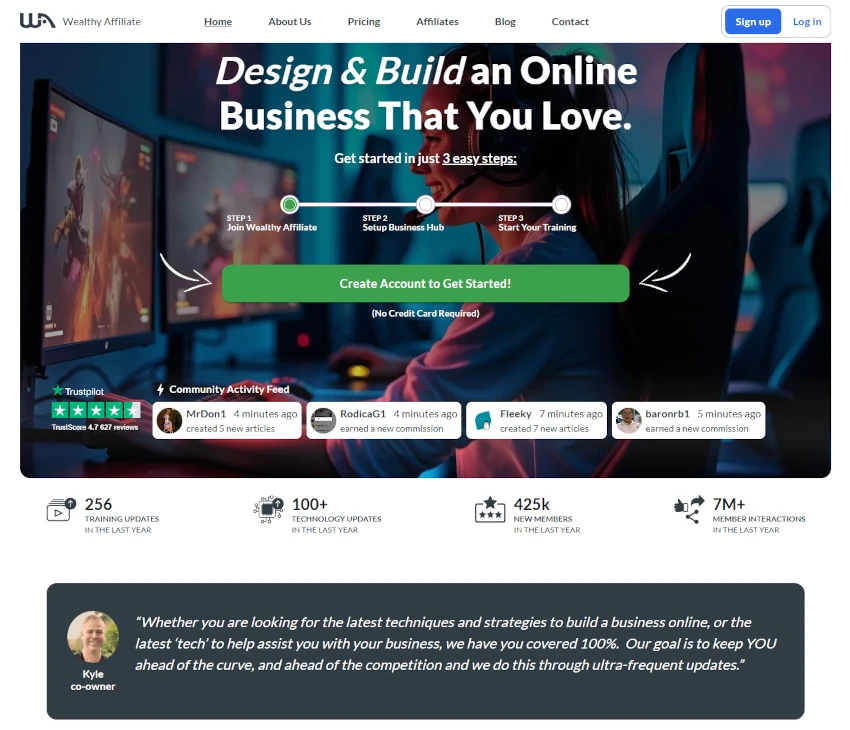
Disclosure: Some links here are affiliate links. I get a commission if you buy, but you don’t pay extra. This supports my blog and lets me share quality content. Thanks!
Introduction
Hey there, fellow entrepreneurs and bloggers! Today, we’re diving into a topic that’s crucial for anyone building an online business: SEO, or Search Engine Optimization.
Now, you might’ve heard this term thrown around a lot, but maybe you’re not entirely sure what it means or why it matters.
Let me tell you, SEO is like the secret sauce that helps your blog get discovered by the right people – the ones who are genuinely interested in what you have to offer.
Think about it: you pour your heart and soul into crafting amazing content, but if no one sees it, how can you achieve your online business goals?
SEO helps bridge that gap. It’s all about making your blog more visible in search engine results, attracting targeted traffic, and ultimately, turning those visitors into loyal fans (and maybe even customers!).
So, whether you’re a seasoned blogger or just starting out, mastering SEO basics is key to unlocking the true potential of your online space. Let’s break it down together, shall we?
Click button for more blog posts about digital marketing >>>
What is SEO, Anyway? Demystifying the Magic
Okay, so SEO stands for Search Engine Optimization. In simpler terms, it’s the process of fine-tuning your blog to be more easily understood by search engines like Google.
Imagine your blog as a well-organized store filled with amazing products (your content!). SEO is like putting up clear signage and keeping the aisles clutter-free, making it easier for customers (readers) to find exactly what they’re looking for.
Here’s a cool analogy: think of search engines like giant librarians. They have a massive amount of information at their fingertips (all the websites on the internet!), and their job is to connect users with the most relevant content.
By optimizing your blog for SEO, you’re essentially helping those search engine “librarians” understand what your content is about and who it’s best suited for. This, in turn, increases your chances of appearing on the first page of search results, which is prime real estate for attracting website visitors.

Why Should You Care About SEO?
Let me answer that with a question: wouldn’t it be amazing if potential customers could easily find your blog when they search for topics related to your niche? With effective SEO, that’s exactly what happens! Here are just a few reasons why SEO is your best friend as a blogger or entrepreneur:
- Boosts Organic Traffic: The ultimate goal is to attract visitors who are genuinely interested in what you have to offer. SEO helps you achieve this by increasing your visibility in search results pages organically, without relying on paid advertising.
- Targeted Audience Reach: Imagine if you could attract the perfect readers, the ones who resonate with your message and are more likely to convert into paying customers. SEO helps you do just that by optimizing your content for relevant keywords that your target audience is actively searching for.
- Builds Brand Awareness & Credibility: Ranking higher on search engine results pages (SERPs) increases your brand visibility and establishes you as a credible source in your niche. This can lead to more trust, loyalty, and ultimately, more success for your online business.
Alright, convinced that SEO is worth your attention? Let’s get down to the fun part – optimizing your blog posts for search engine domination (well, maybe not domination, but definitely success!)

SEO in Action: Your Step-by-Step Guide to Blog Post Optimization
Now, SEO might sound like a technical beast, but fear not! Here’s a step-by-step guide that will equip you with the essentials to get started:
1. Keyword Research: Unlocking the Secrets of Your Audience
Before you start crafting content, it’s crucial to understand what your target audience is searching for online. This is where keyword research comes in. Keywords are the terms and phrases people use in search engines to find information.
By identifying relevant keywords with good search volume (meaning, how often people are searching for them), you can tailor your content to attract the right kind of visitors.
There are plenty of free and paid keyword research tools out there. Some popular options include Google Keyword Planner, SEMrush, and Ahrefs. While these paid tools offer advanced features, even as a beginner, you can leverage free options to get started.
Wealthy Affiliate’s Jaaxy is a powerful keyword research tool that I always use to get my blog posts on 1st pages of Google and other search engines. It comes free with the Free Starter membership.
Here are some tips for uncovering those golden keywords:
- Think Like Your Audience: Put yourself in your ideal reader’s shoes. What questions would they be asking? What problems are they trying to solve? Use those questions and phrases as a starting point for your keyword research.
- Long-Tail Keywords: Don’t just focus on broad, one word keywords. Explore long-tail keywords – these are more specific phrases that are less competitive and often have higher conversion rates (meaning, they’re more likely to convert readers into subscribers or customers). For example, instead of targeting the keyword “affiliate marketing,” you could target “best affiliate marketing programs for beginners in 2024.”
- Pro Tip: Many SEO tools allow you to see what other websites ranking for your target keyword are doing. Analyze their content to see how they’re incorporating the keyword and use that as inspiration for your own blog post.
2. Craft Compelling Titles & Headings: The Art of Captivating Clicks
Here’s the truth: people judge a book (or blog post) by its cover (or title). This is where crafting compelling titles and headings (H1, H2, etc.) becomes crucial. Your title is essentially your first impression, so you want it to be informative, engaging, and optimized for search engines.
Here are some tips for writing titles and headings that get clicks:
- Incorporate Your Target Keyword: Naturally include your target keyword in your title and headings. However, prioritize readability – keyword stuffing (overusing keywords unnaturally) is a big no-no!
- Spark Curiosity: People are naturally drawn to intriguing titles. Use strong verbs, ask questions, or highlight benefits to pique their interest and make them want to learn more.
- Keep it Concise: While you want to be informative, avoid overly long titles that might get cut off in search results. Aim for clarity and conciseness.
3. Content is King: Optimizing Your Content for Value and Readability
Alright, you’ve got your target audience in mind, and you know what keywords they’re searching for. Now comes the most important part – crafting high-quality content that provides value to your readers. Remember, SEO is not just about ranking high in search results; it’s about attracting and retaining a loyal audience.
Here are some golden rules for content optimization:
- Focus on Value: Always prioritize creating content that solves your audience’s problems, answers their questions, or entertains them. Solid, informative content is the foundation of a successful blog, and search engines reward websites with valuable content.
- Content Length: While there’s no one-size-fits-all answer, generally speaking, aim for content that’s comprehensive and informative. In-depth blog posts (around 1,000 words or more) tend to perform better in search results.
- Readability Matters: Break up your text with subheadings, bullet points, and short paragraphs to improve readability. Use clear and concise language that your target audience can easily understand.
- Internal Linking: Think of your blog as a giant web of information. Link to relevant blog posts within your content to keep readers engaged and navigate them deeper into your website. This also helps search engines understand the structure and hierarchy of your content.
- User Experience (UX) Matters: Don’t underestimate the importance of user experience (UX). Make sure your website loads quickly, is mobile-friendly, and offers a seamless browsing experience. Search engines consider these factors when ranking websites.
4. Image Optimization: Don’t Forget the Power of Visuals
Images are a powerful tool for enhancing your content and user experience. Here’s how to optimize images for SEO:
- High-Quality Images: Use visually appealing images that are relevant to your content. Grainy or irrelevant stock photos won’t do you any favors.
- Alt Text: Alt text is a brief description of the image that appears when the image cannot be displayed. Use relevant keywords in your alt text to improve image searchability.
- File Size: Large image files can slow down your website loading speed. Use tools to compress your images without sacrificing quality.
5. Meta Description: Craft a Compelling Summary
The meta description is a concise summary of your blog post that appears in search results underneath the title. Think of it as your elevator pitch – it should be informative, engaging, and entice readers to click on your blog post.
Here are some tips for writing a compelling meta description:
- Keep it Short and Sweet: Aim for around 160 characters or less.
- Include Your Target Keyword: Naturally incorporate your target keyword into the meta description.
- Highlight Benefits: Briefly mention what readers can expect to gain from your blog post. Spark their curiosity and make them want to learn more.
Unleash the Power of SEO with Wealthy Affiliate
Now that you’re equipped with these SEO essentials, it’s time to take action and optimize your blog posts!
Remember, SEO is a journey, not a destination. It takes consistent effort and ongoing learning to see results. But the rewards are well worth it – a thriving blog that attracts targeted traffic, builds brand awareness, and ultimately helps you achieve your online business goals.
Here at my website, I am all about empowering entrepreneurs and bloggers to succeed online. And that includes mastering SEO!
But let’s be honest, the world of SEO can be vast and ever-changing. If you’re looking for a comprehensive training platform and a supportive community to guide you on your SEO journey, then consider checking out Wealthy Affiliate.
Launch Your Online Business with Wealthy Affiliate
Get started with the Free Starter Membership, and enjoy these fantastic benefits:
- Free Practice Website: Begin your online business with a ready-to-use website.
- Business Hub: Access step-by-step training to learn and grow your online business.
- Keyword Research Tool: Discover keywords that will get your content found.
- AI Article Designer: Utilize one of the best AI tools for creating high-quality, SEO-optimized content quickly and efficiently.
- Tech Team & Community Support: Receive ongoing support from our tech team and vibrant community.
Ready to start your business and make money? Click on the image below for a link to Wealthy Affiliate and start your free trial today!

Why Wealthy Affiliate?
Wealthy Affiliate is more than just an SEO training program. It’s a one-stop shop for everything you need to build a successful online business. Here are just a few reasons why Wealthy Affiliate might be the perfect fit for you:
- Comprehensive SEO Training: Wealthy Affiliate offers a step-by-step SEO training course that covers everything from keyword research to on-page optimization and backlink building. Whether you’re a complete beginner or looking to refine your existing strategy, Wealthy Affiliate has the resources to help you excel.
- Keyword Research Tools: Gone are the days of guesswork! Wealthy Affiliate provides access to powerful keyword research tools that help you identify the most relevant and profitable keywords to target.
- Thriving Community: One of the biggest advantages of Wealthy Affiliate is the supportive community of entrepreneurs and bloggers. Connect with like-minded individuals, share experiences, ask questions, and get valuable feedback to help you grow your online business.
- Expert Guidance: Wealthy Affiliate offers access to experienced mentors who can answer your questions, provide personalized guidance, and help you overcome any SEO challenges you might face.
Ready to take your blog to the next level and unlock the true power of SEO? Join Wealthy Affiliate today and start building a thriving online presence!
Launch Your Online Business with Wealthy Affiliate
Get started with the Free Starter Membership, and enjoy these fantastic benefits:
- Free Practice Website: Begin your online business with a ready-to-use website.
- Business Hub: Access step-by-step training to learn and grow your online business.
- Keyword Research Tool: Discover keywords that will get your content found.
- AI Article Designer: Utilize one of the best AI tools for creating high-quality, SEO-optimized content quickly and efficiently.
- Tech Team & Community Support: Receive ongoing support from our tech team and vibrant community.
Ready to start your business and make money? Click on the image below for a link to Wealthy Affiliate and start your free trial today!

Bonus Tip: Free SEO Resources
While Wealthy Affiliate offers a comprehensive training program, there are also plenty of free SEO resources available online. Here are a few to get you started:
- Moz Beginner’s Guide to SEO: https://moz.com/beginners-guide-to-seo
- Backlinko’s SEO Learning Center: https://backlinko.com/
- Google Search Central: https://developers.google.com/search
Remember, the key is to take action, experiment, and continuously learn. With dedication and the right tools at your disposal, you can master SEO and watch your blog blossom into a powerful online asset.
Increase Blog Traffic: Your Beginner’s Guide to SEO
Timotheus Final Thoughts
By implementing these SEO strategies, you’ll be well on your way to attracting more organic traffic, building a loyal audience, and achieving your online business goals.
Don’t be afraid to experiment, track your results, and refine your approach as you learn more.
The exciting world of SEO awaits you – go out there and conquer it!
And as always, feel free to leave a comment below if you have any questions about SEO or anything else related to online business. Happy blogging!
If you have ANY questions, or anything to clarify, please drop a comment below. I will be happy to help you.
I wish everyone good heath, wealth, and success!

Timotheus
AI & Digital Marketing Expert | App Developer | Lecturer | Amazon Bestselling Author | Cancer Survivor